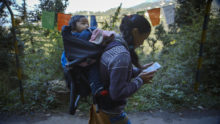Munk School Staff
As our digital world expands, so does the potential for restrictions on our individual liberties. That’s why for over a decade, the Citizen Lab at the Munk School of Global Affairs has worked tirelessly to expose potential threats to human rights and global security in the digital realm. Led by Ron Deibert, the Citizen Lab’s goal is to unveil how the very same technologies that can accelerate democratic change can also be used as a tool for censorship, surveillance, and information warfare. “I feel as though we are serving a kind of early warning function for civil society in the same way that state intelligence agencies are supposed to provide such a warning for governments,” explains Deibert.
In 2013, Deibert wrote Black Code, an informative yet accessible account of Citizen Lab’s research. “The experiences of these research efforts were the perfect vehicle to tell stories that would at the same time inform the public about what is going on ‘beneath the surface’ of the Internet, and which are having an adverse effect on human rights and the prospects for democracy,” Deibert says. The film adaptation, directed by Canadian documentary filmmaker and cinematographer Nicholas de Pencier, will screen April 14 to 19 at the Hot Docs Ted Rogers Cinema.
Taking viewers around the globe from Toronto to Syria and many countries in between, Black Code showcases the ways in which political activists have transformed the Internet into a tool for resistance and mobilization, all while governments use the same channels as tools for surveillance. “There were things in Ron’s book that were revelatory about the exposure we face through our electronic communications,” says de Pencier. “I wanted to bring the viewer to experience Ron’s concerns by travelling to places where these very abstract issues related to cyberspace impact people in non-abstract ways.”
The story Black Code tells is one that involves Tibetan exiles under Chinese surveillance in Dharamsala, India; media activists in Brazil who share their alternative views via online platforms and Syrian citizens tortured for opposing the regime through Facebook posts. “The more we raise general consciousness towards the issue, the more people can act individually to keep the dynamics of democracy alive in the digital age,” explains de Pencier.
It is the same impetus that drives Deibert and his colleagues at the Citizen Lab. “We need to encourage a culture of curiosity about technology, to promote an ethic of experimentation, to encourage users to read terms of service, take apart their devices and understand what happens beneath the hood, and to extend that same persistent curiosity to governments and corporations,” argues Deibert. “It’s about encouraging a diligent attitude among the citizenry to digital technologies embodied by the original notion of ‘hacking’ as ‘taking things apart and experimenting with them.’ My entire career I have fought against that misappropriation of the term as ‘breaking the law.’ To be a hacker today is to be an informed and empowered digital citizen.”
Ron Deibert and Nicholas de Pencier will attend the April 14, 6:15 p.m. screening of Black Code for a Q&A session after the film. The University of Toronto is giving away a limited number of free tickets to the April 14, 6:15 p.m. screening. Follow @UofT on Twitter and retweet this contest post for your chance to win. Twitter contest closes on April 13 at 12 p.m. EST.
Visit the Hot Docs Ted Rogers Cinema website for additional screening dates and times.
April 10, 2017
